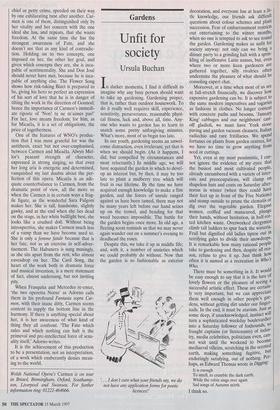Gardens
Unfit for society
Ursula Buchan
In darker moments, I find it difficult to imagine why any busy person should want to take up gardening. Gardening proper, that is, rather than outdoor housework. To do it really well requires skill, experience, sensitivity, perseverance, reasonable physi- cal fitness, luck and, above all, time. Any- one who wants to garden has to learn to snatch some pretty unforgiving minutes. What's more, most of us begin too late.
In our youth, gardening seems an unwel- come distraction, even irrelevant, yet that is when we should begin. (As it happens, I did, but compelled by circumstances and most reluctantly.) In middle age, we will have acquired the garden in which to devel- op an interest but, by then, it may be too late to plant a mulberry tree which will fruit in our lifetime. By the time we have acquired enough knowledge to make a fine garden, and the forces ce unrule ranged against us have been tamed, there may not be many years left before our hand seizes up on the trowel, and bending for that weed becomes impossible. The battle for the garden begins once more. In old age, a fleeting scent reminds us that we may never again wander out on a summer's evening to deadhead the roses.
Despite this, we take it up in middle life; and, with it, a number of anxieties which we could probably do without. Now that the garden is so fashionable as exterior . . I don't care what your friends say, we do not have any application forms for poetic licences!' decoration, and everyone has at least a lit- tle knowledge, our friends ask difficult questions about colour schemes and plant succession. Fear of embarrassment restricts our entertaining to the winter months, when no one is tempted to ask to see round the garden. Gardening makes us unfit for society anyway: not only can we bring a dinner party to a grinding halt with a sprin- kling of inoffensive Latin names, but, even where two or more keen gardeners are gathered together, silly rivalries often undermine the pleasure of what should be consoling expert chat. Moreover, at a time when most of us are at full-stretch financially, we discover how expensive gardening can be. It is subject to the same modern imperatives and vagaries as fashions in clothes. No longer content with concrete paths and besoms, `January King' cabbages and our neighbours' cast- off gladioli, we must have York stone paving and garden vacuum cleaners, Italian radicchio and rare fritillaries. We spend fortunes on plants from garden centres, for we have no time to grow anything from seed or cuttings.
Yet, even at my most pessimistic, I can- not ignore the evidence of my eyes: that the busiest and most cultivated people, already encumbered with a variety of inter- ests and preoccupations, will clamp on shapeless hats and coats on Saturday after- noons in winter (when they could have their feet up in front of the Five Nations) and stomp outside to prune the clematis or dig over the vegetable garden. Elegant women, coiffed and manicured, plunge their hands, without hesitation, in half-rot- ted kitchen waste. Overworked clergymen climb tall ladders to spur back the wisteria. Frail but dignified old ladies tiptoe out in terrifying gales to divide their snowdrops. It is remarkable how many rational people take to gardening and then, despite all rea- son, refuse to give it up. Just think how often it is named as a recreation in Who's Who. There must be something in it. It would be easy enough to say that it is the lure of lovely flowers or the pleasure of seeing a successful artistic effect. These are certain- ly very important, but we can appreciate them well enough in other people's gar- dens, without getting dirt under our finger- nails. In the end, it must be atavism. Just as some deep, if unacknowledged, instinct will turn a sophisticated weekday boulevardier into a Saturday follower of foxhounds, so fraught captains (or lieutenants) of indus- try, media celebrities, politicians even, can- not wait until the weekend to become mediaeval villeins, scratching in the earth, making something fugitive, but enduringly satisfying, out of nothing. Per- haps, as Edward Thomas wrote in Digging' It is enough
To smell, to crumble the dark earth,
While the robin sings over again scented
Sad songs of Autumn mirth. I think so.


































































 Previous page
Previous page